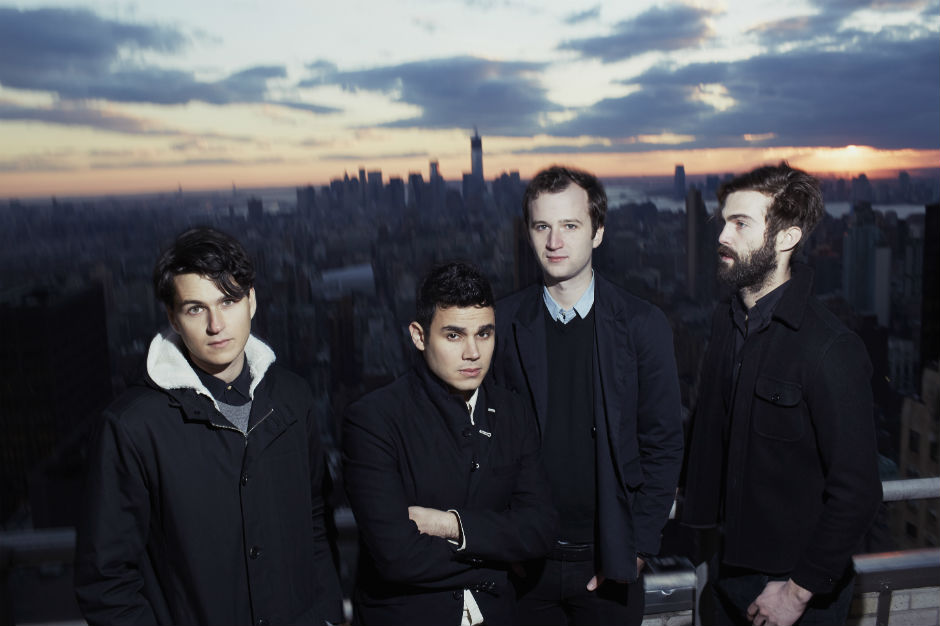Ryan Dombal of Pitchfork recently observed to Rostam Batmanglij in an interview that “there are probably more young artists in Brooklyn who would rather produce a song for Carly Rae Jepsen than start an indie rock band at this point.” This in turn led Batmanglij — who actually has collaborated with Ms. Jepsen — to wonder aloud, “What happened to all the bands? Is New York responsible for it, or is it just that bands are corny now?” On Tuesday, we learned that his answer might be closer to the latter: The keyboardist/programmer/producer tweeted a message stating he’s leaving Vampire Weekend.
There’s no reason to suspect he’s no longer on good terms with the band — he explicitly stated he’ll continue to work with frontman Ezra Koenig, including on Vampire Weekend songs. He’s less explicit about continuing to write with VW bassist Chris Baio (who also released an extracurricular solo album in 2015) or drummer Chris Tomson. If they aren’t all still friendly, they’ve been great at cloaking it; this is a band who’s operated as a well-thought, fully realized unified front since day one. And maybe that’s one reason the 32-year-old MVP’s exit is such disarming news.
Another reason is that it sucks. Vampire Weekend are the most important rock outfit of the 2010s, at least in the classic Clash/Nirvana/Radiohead sense. Their only competition is Arcade Fire, who aren’t exactly headed for a fall, but who people are kinda tired of. While the Montreal band has gotten their U2 flex on by winning the Grammy for Album of the Year and throwing a New Orleans parade in honor of David Bowie, Vampire Weekend have played the R.E.M., earning two No. 1 albums but mostly wowing critics thanks to their surprising pool of references, historical and musical. These encompass not just Afropop, which has been discussed to death, but also Biggie, Rancid, and “Hey Ya!” They embraced Auto-Tune without making a big deal about it, while Arcade Fire pretty much bought billboards to announce their discovery of dance influences.
On 2013’s epochal Modern Vampires of the City (which merely won the Grammy for Best Alternative Album) they dared to be even more geekily uncool than their ska-informed beginnings by flirting with John Philip Sousa-style brass on “Unbelievers,” earnest massed gospel choirs on “Ya Hey,” and “Canon in D”-jacked-up-to-full-crumpet harpsichord on “Step.” And yes, their not-so-secret weapon Batmanglij — who studied classical harmony at Columbia — arranged them all. Just look at the liners on City, which credit Koenig on lead vocals, plus piano on one song; Baio on bass; Tomson on drums; and Batmanglij on (deep breath) piano, guitars, banjo, vocal harmonies and backing vocals, drum and synth programming, keyboards, shaker, and lead vocals on final track “Young Lion” for good measure.
Throwing around names like U2, R.E.M., and Arcade Fire is merely to point out the weight class that Vampire Weekend are in. Their three albums are three of the best released during this band’s existence: 2008’s summery self-titled debut, 2010’s knottier, heftier Contra, and 2013’s truly Herculean MVOTC, each one better than the last while simultaneously taking longer to sink in. This is a band that hasn’t stopped growing yet, but losing Batmanglij threatens to derail their history-making run entirely. Ezra Koenig has said that he and Batmanglij are the “two main songwriters of the band,” so imagine U2 soldiering on without the Edge, or Radiohead minus Jonny Greenwood. We already know how the Clash fared without Mick Jones and how R.E.M. managed to continue without Bill Berry; there weren’t many protests when they wound up breaking up. That’s what’s at stake. Because Vampire Weekend’s remaining three virtuosos are still presumably in their prime, maybe they’ll take after the Stones following the loss of Brian Jones and go on to still make Let It Bleed, Sticky Fingers, and Exile on Main Street.
But about the Carly Rae Jepsen thing. Yes, more young Brooklyn artists would rather produce one of her songs at this point than form an indie-rock band, and that’s not a horrible trade-off. But few — if any — bands in the 2010s, indie or not, are as good as Vampire Weekend, and the backbone of their artistic success is leaving the fold, at least in some capacity. Is his work with Carly Rae Jepsen top-notch? Conceivably. Will his collaborations with A.G. Cook of PC Music and certainly others to come be exciting? Of course. Is his new solo single “EOS” kind of aimless and unrewarding? Definitely. Does any of what I think matter when it comes to one artist’s decision to leave a functioning unit for his own path? Not a skosh.
Vampire Weekend referred to Modern Vampires of the City as the last of “a trilogy,” which only made sense at the time as far as that album bore weight and significance that no band could keep up for a lifetime. Now we know the rest. Koenig and Batmanglij are both downplaying how this will affect the future of the band, even going as far as to say he’s all over Album No. 4. But they sound like divorced parents trying to dance around the truth and reassure their kids.
At least one full-time member decided that they contributed as much as they had to give to an excellent and visionary rock band, that synthesis that’s become rarer than ever. The reason it stings so much is because Vampire Weekend feels like the last of a dying breed, if there ever was one like them at all. No one else has yet come forth that can filter Paul Simon’s Graceland through electronic spiderwebs and follow a reference to a Lydian king circa 560 B.C. with one to a non-canon Run-DMC album. It’s hard to imagine Vampire Weekend without Rostam Batmanglij, its John Paul Jones and Jimmy Page combined. But we’re going to find out how much of that brilliance is retained now that Koenig’s lost half of his songwriting team. Hopefully it’s going to be more than we fear.





